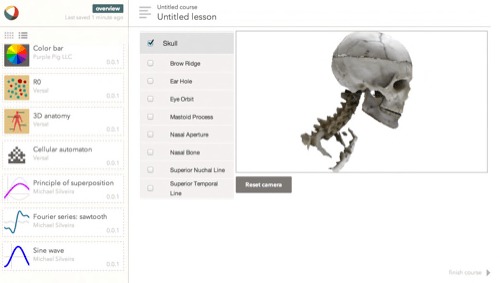
What’s wrong with online learning companies like Udemy, Lynda and their ilk? According to a new company called Versal, it’s that their lectures are boring. Low-tech, even.
“Existing courses are really just PowerPoints or videos,” said Versal CEO Gregor Freund. “They’re really only taking advantage of ten percent of the computer. If a course is on a computer it should be taking advantage of its full capabilities.”
“As they exist now, online courses require incredibly motivated learners to stick with them,” he added.
See also: Online Universities: Why They Still Don’t Measure Up
Freund was so frustrated with what he calls the current “one-dimensional” environment of online learning that he decided to start his own competitor. Today marks the launch of Versal, an online learning company that wants to make free, interactive lectures.
Versal’s killer app is something it calls the “gadget” tool. Through this tool, educators can utilize interactive learning exercises, or “gadgets,” that students can study, manipulate, and model. Versal’s drag-and-drop lecture creator already offers gadgets that illustrate interactive infographics, mathematical expressions, 3D modeling, and color theory.

How Gadgets Work
As a citizen of the Internet, I admit to having a pretty short attention span. I never would have learned ActionScript without Lynda lectures, but I probably could have learned it faster if I hadn’t zoned out so many times during the 20 minute videos. Versal’s gadgets make lectures feel less like learning and more like gaming.
However, Versal’s gadgets are pretty specific to the needs of its beta lecturers, who cover science, technology, and art. What if an educator wants something totally new? Actually, Versal is counting on that to happen.
If the gadget an educator needs doesn’t exist yet on Versal, the educator can create it and upload it to Versal, commission a JavaScript developer to create it and upload it to Versal, or see if it already exists online and get permission to put it in a lecture.
“We’re not worried about [getting more gadgets],” said Freund. “JavaScript learning gadgets already exist in isolation all over the Web. Plus, developers have been incredibly eager to help our beta lecturers, and we expect that to continue once we launch.”
A Free Tool That Pays
Versal launches today with just three example courses. That’s because it isn’t targeting students. In order to compete with Lynda or Udemy for student’s attention, it first needs teachers to give it content.
In order to lure certified teachers, the company is also launching the Versal Foundation. Nonprofits or universities interested in creating courses on Versal can apply for grants for anywhere from $1,000 to $25,000.
To prompt learners to follow educators, Versal currently has no plans to charge for any of its courses. Freund would not disclose to me how, or if, Versal has a money-making strategy or even plans to implement one. However, we can guess that Freund has the resources to fund the Versal Foundation thanks to some of his previous startups. When Motorola acquired his startup, Starfish Software, he likely got a substantial payout. Freund also holds several software patents from his time as President and CEO of Zone Labs.
“Our primary concern right now is creating better online education,” he said. “Computer are designed for interactivity. We want to help teachers bring courses to life.”
It’s a nice sentiment, and Versal has held up its part of the deal. The question is whether, now that they’ve built it, educators will come.
Images courtesy of Versal

















